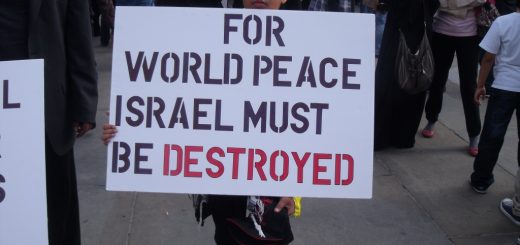What Must A Community Know?

Every now and then, I am bowled over by some piece of Torah that I read. Even if I wrote the words myself. Such was the case after I finished writing my weekly parshah shiur last week.
For a long time, I have taken a single sefer each year, and adapted one piece for each weekly parshah on Torah.org. This year’s choice has been Meshivas Nafesh, by Rav Yochanan Luria, who lived in Alsace in the second half of the 15th century. Among other reasons, his thoughts are particularly interesting because you can still see the style of the Rishonim in his words at times, very committed to issues of basic pshat. At other times, however, you see him breaking new ground, in forays that anticipate later drush works.
When I finished writing the paragraphs below, it struck me that he was reaching out across the centuries to address our community today:
Alternatively, we can detect a second approach to our parshah by noting its juxtaposition to what precedes it: “When you besiege a city for many days to wage war against it…do not destroy its trees.”[1] The city might be an allusion to the individual, in the same manner as the “small city, and few people in it, and a great king comes against it.”[2] This is interpreted as an allusion to the constant besieging of a person by the yetzer hora. Similarly, here in our section of Devarim, the city may represent an individual taking strong measures against his own impulses. Wishing to rid himself of his weakness for comfort and pleasure, he besieges his own being. He attempts for long periods of time to deaden parts of himself through constant fasts, privation, and self-denial.
To such a person the Torah speaks, “Do not destroy its trees.”[3] Don’t damage the body. “Only a tree that know is not a food tree, it you may destroy.”[4] Only those things that are completely non-essential – things that are luxuries – you may rid yourself of.
You might counter that the gemara relates several stories about individuals who, as part of their repentance, practiced self-denial to the point of death. We should not learn from them; this is not the best way to go. Possibly, those individuals knew enough about themselves that there was no way back from their sin other than in extreme measures against the body. They do not serve as a general model.
This is the other message of our section. “If a corpse will be found…[and] it was not known who smote him.”[5] No one knows why he died. No one killed him! He died through his own ill-advised practice of abusing himself. Tragically, he was not aware of better ways to live. The townspeople had not broadcast proper conduct and behavior to the masses. They must all gather and perform the mitzvah of the decapitated heifer. They all need atonement – the living, and the one who died through his own actions. The living declare that their hands did not shed his blood – at least not directly.
That, however, does not acquit them. “Our eyes did not see.”[6] They must say that they were unaware of the way he was treating himself. Had they known, they would have intervened and reasoned with him. Furthermore, they were not aware of such conduct in general. If they had been, they would have taken steps to properly educate the community to stay away from practices of mortifying the flesh.
Even it that declaration is true, they still require atonement. People are obligated to learn – and to anticipate crucial needs of the community, even when they have no personal experience with them!
In his day, the self-destructive behavior that R. Luria noticed was tied to ideas about teshuva through punishing or suppressing the body and its desires. This would not be at the top of our list of social ills today. If, however, you take his comments to refer to all sorts of similar behavior, he could have written the piece about alcohol abuse, or drug abuse, or anorexia, or gambling, or molestation, or [fill in the blank.] His point would remain the same. If the community leaders know about the problem, they are dutybound to get involved. If they don’t, they are negligent in not knowing about about social ills that plague it.
It’s almost as if R. Luria had come back almost six centuries later to write a plug for Amudim.




Interesting would be to know how much of this drasha is reflective of the societal (Jewish and Non-Jewish) trends around R. Luria as well as how much was based on personal nature/nurture/personal experience?
kt
I know nothing of R. Lurie or his environment. But to continue along the path R. Adlerstein suggested, I imagine that he lived in relatively good times, like today. In such times various reactions can occur. R. Lurie advises against the extremes that can often occur. An important principle to continually live by, and avoid the reactions at both extremes that are all too prevalent.
Not every community is close-knit and caring enough to look after all its members, even on a superficial level.
The Amudim twist at the end was a surprise to me, I thought the direction you were headed in was too discuss the destructive behavior of those not wearing masks and not keeping social distancing, and the approval given to them by some community leaders…
The worst thing is to declare a policy, week after week, and make no effort to make it stick. Talking in shul is a perennial example. The greatest inciters to talking are authority figures who do it openly and frequently.
The notion that opposing the wearing of suffocating masks as somehow being destructive only resonates to those who blindly accept anything said by the Leftist mainstream media and Anthony Fauci, who has been given far too much power in our current society. There are some of us who have enough independence of thought to question such repressive policies in which the government tells us what we must do to our own faces, whether we can operate our businesses, have parties, or daven in our shuls.
Masks deprive our brains of sufficient oxygen, while forcing us to breathe in our own poisonous carbon dioxide as well as the germs that stick to one’s dirty masks. Most of us do not have the Chinese virus at all, so to force all of us to wear masks, makes no sense, and cedes to much of our personal freedoms to an increasingly all-powerful government that has become drunk with power.
Overwhelmingly, the ones who have lasting negative effects from the Chinese virus, are those with pre-existing health conditions. Rather than resorting to government mandated, repressive measures such as mask wearing and lockdowns, we should give back the responsibility for our health back to us as individuals. I myself have many of the pre-existing health conditions that make me more susceptible to getting the disease, G-d forbid, but I would never seek to impose on others that they must give up their individual freedoms for me. It is up to each of us to guard our own health, to find ways to strengthen our own immune systems, which is really the best way to reduce our chances of contracting the Chinese virus and so many other diseases anyway.
I realize that Judaism depends not on our personal taste but rather on following G-d’s Will, and yet I hope it is acceptable for me to express things that I like about our way of thinking and living. Many decades ago, when I was younger and thought that I had all the time in the world, I delved into Eastern religions, especially Hinduism. I was so caught up in it that sometime later, my younger sister confessed to me that she had thought that she had lost me forever to it. Even back then, though, one of the things that bothered me about it was its rejection of the physical world (I conveniently ignored its idolatry). Buddhism is far worse than that, stomping on our individual selves and existence altogether, as it regards our lives as something of a curse.
Judaism is not like that, although there are exceptions as there always are in our very complex, nuanced, and thoughtful religion. Moses is said to have sexually separated from his wife because he had reached such a transcendent level of holiness. When a nazir returns to normal life, he is criticized by the RambaN for not sticking with such a self-denying lifestyle longer. Centuries later, there were Chassidim rolling in the snow early on very cold, wintery mornings as their way of punishing their physical bodies. We have several fast days, although they never last for more than a day, plus it is said that fasting on Yom Kippur when done properly does not feel like an affliction at all, as we are too wrapped up in our prayers to G-d and the whole meaning of the day in general to even think about food.
All that I am mentioning here are, of course, the exceptions to the rule. The same RambaN that excoriates the nazir for not being spiritual enough, says that part of our future world will involve the full resurrection of our bodies, as they played a major role in our following G-d’s Commandments. I suspect that it is more than that, that G-d knows our nature, and so He knows that we cannot be fully happy without part of that joy being intertwined with the physical. Rather than deny the physical, Judaism takes the physical and finds a way to elevate and sanctify it. To this day, I marvel at the brilliance of such an outlook. For that and for so many other reasons, I have to admit to what an absolute privilege it is to be a member of the Jewish people.